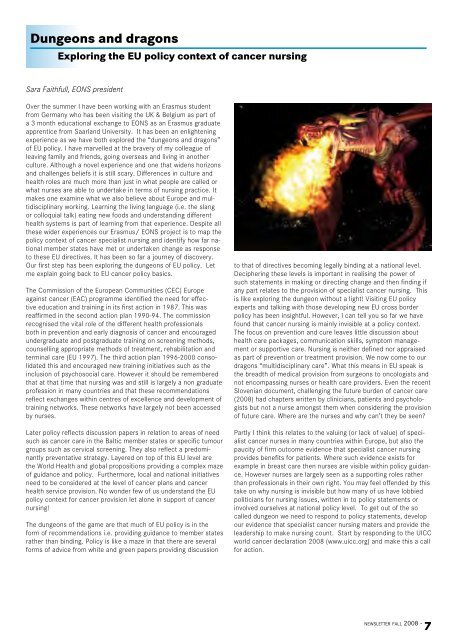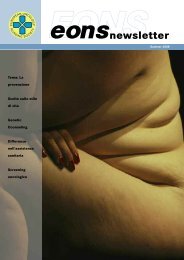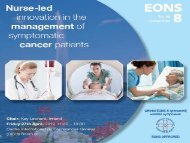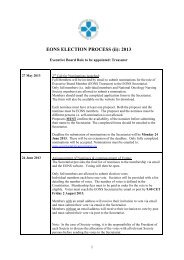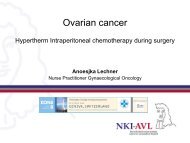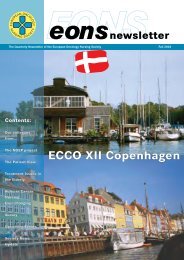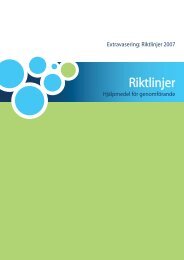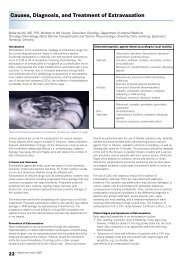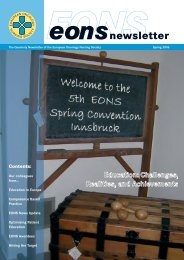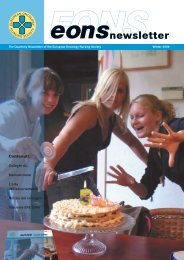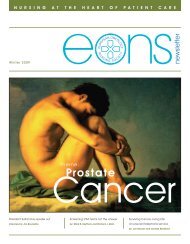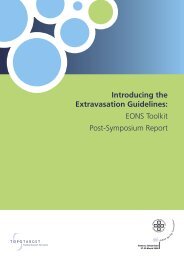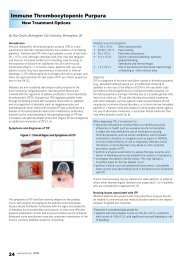for educators is that availability of suitable quality clinical learningplacements are becoming less available and funding for clinicaleducators to support students in practise is often limited if availableat all. Clinical skills laboratories have emerged as an alternative as<strong>the</strong>y provide a stable learning context to reproduce clinical practiceand assist in skill development. .Repeated execution of a procedure in order to develop and maintaincompetency is a feature of industries such as aviation where errorminimisation is paramount (Armitage and Knapman 2003). Indeedcase volume is often used as a criteria for judging <strong>the</strong> suitability ofa clinical learning environment in health professional education.Utilising approaches that seek to replicate <strong>the</strong> real world ofhealthcare are also increasingly used to accelerate familiarity withsituations or typical cases through <strong>the</strong> use of simulated learning. Theevidence is mounting concerning <strong>the</strong> benefits of simulation especially<strong>the</strong> impact on <strong>the</strong> confidence of novice practitioners in practice(Moule et al 2008). Confidence without knowledge or skill would be aconcern but <strong>the</strong> elegance of simulation is that many of <strong>the</strong> features ofpractise can be introduced but <strong>the</strong> focus remains on <strong>the</strong> learning notjust getting <strong>the</strong> task done. That said simulation can never replace <strong>the</strong>benefits of experiential learning in practise.This aim of this paper was to explore whe<strong>the</strong>r frameworks that adoptlearning outcomes or competencies make a difference in practice.The benefits of articulating what a practitioner should know and beable to do seem clear even if <strong>the</strong> complexity of robust evaluationin <strong>the</strong> messy real world of health care is elusive. A separate butlinked question is whe<strong>the</strong>r <strong>the</strong> use of instruments, or tools, to assessspecific elements of learning or performance have benefit? Fur<strong>the</strong>r,when all outcomes (or assessments) are aggregated <strong>the</strong> resultconstitutes competency of <strong>the</strong> individual clinician. In response….assuring <strong>the</strong> reliability and validity of assessment in outcome basededucation so patients, employers, regulatory bodies and <strong>the</strong> individualpractitioner can be confident of competence remains a challenge buthopefully one that is not insurmountable in <strong>the</strong> future.ReferencesAdam S (2004) A consideration of <strong>the</strong> nature, role, application andimplications for <strong>European</strong> education of employing ’learning outcomes’at <strong>the</strong> local, national and international levels Scottish Executive ISBN0 7559 1058 3 (available for download from: http://www.scotland.gov.uk/Publications/2004/09/19908/42711 accessed 25/05/08)Armitage G & Knapman H. (2003) Adverse events in drugadministration: a literature review. Journal of <strong>Nursing</strong> Management 11130-140Benner P (1984) From Novice to Expert Menlo Park. CA: Addison-WesleyBenner P, Tanner C A, Chesla C A (1996) Expertise in nursingpractice New York. NY Springer Publishing CompanyBloom B S (1956) Taxonomy of Educational Objectives: TheClassification of Educational Goals: Handbook 1: Cognitive DomainNew York: LongmanCalman L (2006) Patients’ views of nurses’ competence NurseEducation Today 26 8 719-725Consensus Panel on Genetic/Genomic <strong>Nursing</strong> Competencies(2006). Essential <strong>Nursing</strong> Competencies and Curricula Guidelinesfor Genetics and Genomics. Silver Spring, MD: American NursesAssociation.Download from http://www.genome.gov/Pages/Careers/HealthProfessionalEducation/geneticscompetency.pdf (accessed24.08.08)Cowan D T , Norman I J , Coopamah VP (2005) A Project toestablish a skills competency matrix for EU nurses British Journal of<strong>Nursing</strong> 14 (11) 613-617,Department of Health (2004) The NHS Knowledge andSkills Framework (NHS KSF) and <strong>the</strong> Development ReviewProcess (October 2004) available for downloadhttp://www.dh.gov.uk/en/Publicationsandstatistics/Publications/PublicationsPolicyAndGuidance/DH_4090843 (accessed 24.08.08)Department of Heath (2007) Agenda for Change (ResourcePack) download from http://www.dh.gov.uk/en/Managingyourorganisation/Humanresourcesandtraining/Modernisingpay/Agendaforchange/DH_4112440 (accessed24.08.08)Duffy K (2003) Failing students: a qualitative study of <strong>the</strong> factorsthat influence <strong>the</strong> decisions regarding assessment of studentscompetence in practice London Nurse Midwifery Council (Download:http://www.nmc-uk.org/aFrameDisplay.aspx?DocumentID=1330 )(accessed 24.08.08)<strong>European</strong> Commission (2005) Luxembourg Declaration on PatientSafety (see download http://ec.europa.eu/health/ph_overview/Documents/ev_20050405_rd01_en.pdf (accessed 24.08.08)<strong>European</strong> <strong>Oncology</strong> <strong>Nursing</strong> <strong>Society</strong> (2005) EONS Post-basicCurriculum in Cancer <strong>Nursing</strong> 2005 (3rd Edition) Brussels EONSdownload from: http://www.cancerworld.org/CancerWorld/getStaticModFile.aspx?id=902 [accessed 24.08.08]Gonzci A (1994) Competency based assessment in <strong>the</strong> professionsin Australia Assessment in Education 1 27-44Hussey T and Smith P (2002) The trouble with learning outcomesActive Learning in Higher Education 3 (3) 220-233Mallaber C & Turner P (2006) Competency versus hours: Anexamination of a current dilemma in nurse education Nurse EducationToday 26 2 110-114Moule P, Wilford A, Sales R, Lockyer L (2008) Student experiencesand mentor views of <strong>the</strong> use of simulation for learning NurseEducation Today 28 (7) 790-797National Cancer <strong>Nursing</strong> Education Project [EdCAN] (2008)National Education Framework – Cancer <strong>Nursing</strong>: A nationalprofessional development framework for cancer nursing CancerAustralia Canberra (Download from http://www.edcan.org/pdf/EdCanFramework1-6.pdf (accessed 24.08.08)Pietro, D A Shyavitz, LJ Smith R A and Auerbach S (2000) Detectingand reporting medical errors: why <strong>the</strong> dilemma? British MedicalJournal ;320;794-796 doi:10.1136/bmj.320.7237.794Schon D (1983) The Reflective Practitioner: How professionals thinkin action New York: NY Basic BooksSkills for Health (2008) Chemo<strong>the</strong>rapy Framework http://tools.skillsforhealth.org.uk/competence/searchResults?keywords=Chemo<strong>the</strong>rapy&framework%5B%5D=21&level%5B%5D=1&level%5B%5D=2&level%5B%5D=3&level%5B%5D=4&adv_search.x=36&adv_search.y=7(accessed 24.08.08)Topping A, Porock D, Watson R & Stimpson A (2002) Evaluation of<strong>the</strong> effectiveness of educational prepration for cancer nursing andpalliative care. Report to ENB/Department of Health. LondonWatson R, Stimpson A, Porock D and Topping A (2002) Clinicalcompetence assessment in nursing: a systematic review of <strong>the</strong>literature Journal of Advanced <strong>Nursing</strong> 39 5 421-431Wea<strong>the</strong>rall A (2004) National Care Competency http://www.city.ac.uk/sonm/dps/pre-reg-curriculum/references_usefuldocs/KSF%20Cancer%20Competencies.pdf (accessed 24.08.08)- newsletter fall 20086
Dungeons and dragonsExploring <strong>the</strong> EU policy context of cancer nursingSara Faithfull, EONS presidentOver <strong>the</strong> summer I have been working with an Erasmus studentfrom Germany who has been visiting <strong>the</strong> UK & Belgium as part ofa 3 month educational exchange to EONS as an Erasmus graduateapprentice from Saarland University. It has been an enlighteningexperience as we have both explored <strong>the</strong> “dungeons and dragons”of EU policy. I have marvelled at <strong>the</strong> bravery of my colleague ofleaving family and friends, going overseas and living in ano<strong>the</strong>rculture. Although a novel experience and one that widens horizonsand challenges beliefs it is still scary. Differences in culture andhealth roles are much more than just in what people are called orwhat nurses are able to undertake in terms of nursing practice. Itmakes one examine what we also believe about Europe and multidisciplinaryworking. Learning <strong>the</strong> living language (i.e. <strong>the</strong> slangor colloquial talk) eating new foods and understanding differen<strong>the</strong>alth systems is part of learning from that experience. Despite all<strong>the</strong>se wider experiences our Erasmus/ EONS project is to map <strong>the</strong>policy context of cancer specialist nursing and identify how far nationalmember states have met or undertaken change as responseto <strong>the</strong>se EU directives. It has been so far a journey of discovery.Our first step has been exploring <strong>the</strong> dungeons of EU policy. Letme explain going back to EU cancer policy basics.The Commission of <strong>the</strong> <strong>European</strong> Communities (CEC) Europeagainst cancer (EAC) programme identified <strong>the</strong> need for effectiveeducation and training in its first action in 1987. This wasreaffirmed in <strong>the</strong> second action plan 1990-94. The commissionrecognised <strong>the</strong> vital role of <strong>the</strong> different health professionalsboth in prevention and early diagnosis of cancer and encouragedundergraduate and postgraduate training on screening methods,counselling appropriate methods of treatment, rehabilitation andterminal care (EU 1997). The third action plan 1996-2000 consolidatedthis and encouraged new training initiatives such as <strong>the</strong>inclusion of psychosocial care. However it should be rememberedthat at that time that nursing was and still is largely a non graduateprofession in many countries and that <strong>the</strong>se recommendationsreflect exchanges within centres of excellence and development oftraining networks. These networks have largely not been accessedby nurses.Later policy reflects discussion papers in relation to areas of needsuch as cancer care in <strong>the</strong> Baltic member states or specific tumourgroups such as cervical screening. They also reflect a predominantlypreventative strategy. Layered on top of this EU level are<strong>the</strong> World Health and global propositions providing a complex mazeof guidance and policy. Fur<strong>the</strong>rmore, local and national initiativesneed to be considered at <strong>the</strong> level of cancer plans and cancerhealth service provision. No wonder few of us understand <strong>the</strong> EUpolicy context for cancer provision let alone in support of cancernursing!The dungeons of <strong>the</strong> game are that much of EU policy is in <strong>the</strong>form of recommendations i.e. providing guidance to member statesra<strong>the</strong>r than binding. Policy is like a maze in that <strong>the</strong>re are severalforms of advice from white and green papers providing discussionto that of directives becoming legally binding at a national level.Deciphering <strong>the</strong>se levels is important in realising <strong>the</strong> power ofsuch statements in making or directing change and <strong>the</strong>n finding ifany part relates to <strong>the</strong> provision of specialist cancer nursing. Thisis like exploring <strong>the</strong> dungeon without a light! Visiting EU policyexperts and talking with those developing new EU cross borderpolicy has been insightful. However, I can tell you so far we havefound that cancer nursing is mainly invisible at a policy context.The focus on prevention and cure leaves little discussion abou<strong>the</strong>alth care packages, communication skills, symptom managementor supportive care. <strong>Nursing</strong> is nei<strong>the</strong>r defined nor appraisedas part of prevention or treatment provision. We now come to ourdragons “multidisciplinary care”. What this means in EU speak is<strong>the</strong> breadth of medical provision from surgeons to oncologists andnot encompassing nurses or health care providers. Even <strong>the</strong> recentSlovenian document, challenging <strong>the</strong> future burden of cancer care(2008) had chapters written by clinicians, patients and psychologistsbut not a nurse amongst <strong>the</strong>m when considering <strong>the</strong> provisionof future care. Where are <strong>the</strong> nurses and why can’t <strong>the</strong>y be seen?Partly I think this relates to <strong>the</strong> valuing (or lack of value) of specialistcancer nurses in many countries within Europe, but also <strong>the</strong>paucity of firm outcome evidence that specialist cancer nursingprovides benefits for patients. Where such evidence exists forexample in breast care <strong>the</strong>n nurses are visible within policy guidance.However nurses are largely seen as a supporting roles ra<strong>the</strong>rthan professionals in <strong>the</strong>ir own right. You may feel offended by thistake on why nursing is invisible but how many of us have lobbiedpoliticians for nursing issues, written in to policy statements orinvolved ourselves at national policy level. To get out of <strong>the</strong> socalled dungeon we need to respond to policy statements, developour evidence that specialist cancer nursing maters and provide <strong>the</strong>leadership to make nursing count. Start by responding to <strong>the</strong> UICCworld cancer declaration 2008 (www.uicc.org) and make this a callfor action.newsletter fall 2008 -7


